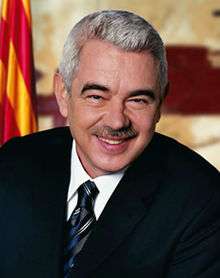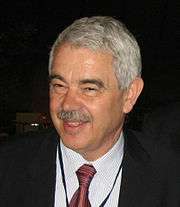Pasqual Maragall
Pasqual Maragall i Mira (Catalan pronunciation: [pəsˈkwal məɾəˈɣaʎ]; born 13 January 1941 in Barcelona) is a Spanish politician and former President of Generalitat de Catalunya.[3] He had previously been Mayor of Barcelona, from 1982 to 1997, and helped run the city's successful Olympic bid.[4]
The Right Honourable Pasqual Maragall | |
|---|---|
 | |
| 127th[1] President of the Government of Catalonia | |
| In office 20 December 2003 – 28 November 2006 | |
| Monarch | Juan Carlos I |
| First Minister | Josep-Lluís Carod-Rovira (2003–2004) Josep Bargalló (2004–2006) |
| Preceded by | Jordi Pujol |
| Succeeded by | José Montilla |
| 115th Mayor of Barcelona | |
| In office 1 December 1982 – 26 September 1997 | |
| Preceded by | Narcís Serra |
| Succeeded by | Joan Clos |
| Leader of the Opposition in the Parliament of Catalonia | |
| In office 16 November 1999 – 17 December 2003 | |
| Preceded by | Joaquim Nadal |
| Succeeded by | Artur Mas (Office suspended between 17 December 2003 and 27 May 2004) |
| President of the organising committee for the Games of the XXV Olympiad | |
| In office 1988–1992 | |
| Leader | Juan Antonio Samaranch |
| Preceded by | Park Seh-jik |
| Succeeded by | Billy Payne |
| Personal details | |
| Born | 13 January 1941 Barcelona, Catalonia, Spain |
| Nationality | |
| Political party | Socialists' Party of Catalonia |
| Spouse(s) | Diana Garrigosa (1965-2020; her death)[2] |
| Children | Two daughters and a son |
| Occupation | Politician |
| Signature |  |
Early life and education
He was born in Barcelona in 1941 as the third of eight siblings. His grandfather was the Catalan poet Joan Maragall. In 1965, he married Diana Garrigosa, and he has two daughters and a son. He was an active member of the Workers' Front of Catalonia and joined the left-wing anti-Franco movement Popular Liberation Front. He studied law and economics at the University of Barcelona between 1957 and 1964.
In 1965, after his studies, he joined the Specialist Office of Barcelona City Council as an economist, work he combined with giving classes in economic theory at the Autonomous University of Barcelona, acting as assistant to the professor, Josep M. Bricall. He also cooperated with the Studies Service of the Banco Urquijo, run by Ramon Trias Fargas.
Between 1971 and 1973, he lived in New York City, where he gained a master of arts in economics from the New School University.
Beginnings in politics
In 1973, he came back to Barcelona and returned to the Barcelona City Council and to the UAB, where he gave classes on urban economics and international economics as temporary assistant lecturer. One year earlier, he supported Convergència Socialista de Catalunya, one of the founding groups of the PSC. In 1978, at the Economics Faculty of the UAB, he presented his doctoral thesis The prices of urban land, The case of Barcelona (1948–1978). In 1978, he was a researcher and guest professor at the Johns Hopkins University in Baltimore. This university would later appoint him doctor honoris causa.
First elections
He joined the PSC electoral list in the first democratic municipal election for Barcelona City Council in 1979 and this party won the most votes at the ballot box. His friend Narcís Serra became Mayor while he became tinent d'alcalde (Deputy Mayor) for Administrative Reform, and later for Taxation. On 1 December 1982 he succeeded Narcís Serra as Mayor of Barcelona, since Serra was appointed minister of Defence by the new Socialist government of Felipe González.[5]
In 1986, Barcelona was chosen to host the 1992 Summer Olympics Accordingly, the city's mayor – Pasqual Maragall – presided over the organising committee (COOB'92). The Olympics provided the city with sorely needed infrastructure. Another Maragall initiative, the 2004 Universal Forum of Cultures, exhibited the same "top-down" approach. It is widely recognised, however, that the '92 Games helped Barcelona to redefine itself as one of the great cities of Europe.[6]
From 1991 to 1997, he was President of the Council of Municipalities and Regions of Europe. He was also Vice-President of the International Union of Local Authorities and President of the Committee of the Regions of the European Union from 1996 to 1998.
Recent years

In 1997, Pasqual Maragall resigned as Barcelona's Mayor and returned to university lecturing in Rome and New York City. However, he came back to active politics and was elected as the PSC-CpC candidate for the presidency of the Generalitat in the 1999 election.
In 2000, he was elected President of the Partit dels Socialistes de Catalunya (PSC-PSOE), and was a member of the Catalan Parliament from 1988 to 1995. From 1999 to 2003, he presided the PSC-CpC parliamentary group.
On 16 December 2003, Pasqual Maragall was elected President of the Generalitat by the Catalan Parliament after cliff-hanger negotiations with the ERC and ICV parties. He finally took office on 20 December. While generally popular as Mayor of Barcelona, Maragall's career as President of the coalition government was marked by a series of crises.[7] A particularly severe one involved Chief Councilor Carod's "secret" trip to France to unofficially negotiate with ETA. Others include: the stormy negotiations over a new Statute of Autonomy for Catalonia in which Maragall and the PSC hovered between a nationalist stance and caving in to central government pressure; the collapse of an entire city block in Barcelona's Carmel district following poorly planned and executed tunnelling work; and a scheme – supported by Maragall's government – to build a tunnel for the AVE high-speed train under the shaky foundations of Barcelona's 19th-century city centre. In October 2005 Maragall met with objections regarding his plans for reshuffling the cabinet without consulting either his coalition partners or his party. Ernest Maragall, the President's brother, was tipped for a ministerial post in the reshuffle. Ernest, who was seen by critics as an apparatchik and held the post of Executive Secretary, whipped up a storm of protest in June 2005 when he opposed plans to make Catalonia's future anti-fraud department independent of the government. Pasqual Maragall's pledges to fight corruption and nepotism in public administration were one of the key planks in his 2003 election campaign.
On 21 June 2006, Maragall announced that he would not be standing for reelection (see 2006 Catalan Parliament election). He offered his support to new President Jose Montilla amongst controversy over Montilla's non-Catalan heritage stating that it did not make Catalonia "less Catalan," and later commented that "our new homeland is Europe." He later stated "our new path is the Mediterranean."[8] On 19 October 2007, it was announced that he would not pay his PSOE membership fee anymore, ending three decades of activity within the party. The following day, he announced that he had been diagnosed with Alzheimer's disease and his plans to create the Pasqual Maragall Foundation to fight against the illness.
References
- "Presidents of the Generalitat". catalangovernment.eu. Generalitat de Catalunya. Retrieved 10 July 2020.
- Muere Diana Garrigosa, la esposa del expresidente de la Generalitat, Pasqual Maragall (in Spanish)
- Fuchs, Dale (2003-11-16). "Catalonian Political Rivals Agree on Seeking Autonomy". The New York Times. ISSN 0362-4331. Retrieved 2019-09-05.
- Marshall, Tim (2004). Transforming Barcelona. Routledge. pp. 65–75. ISBN 9780415288415.
- Johnston, Laurie; Anderson, Susan Heller (1983-03-23). "NEW YORK DAY BY DAY; World of Catalan Comes for a Visit". The New York Times. ISSN 0362-4331. Retrieved 2019-09-05.
- Bagli, Charles V. (2005-06-19). "The Basics; For Olympics Bid, A Spanish Lesson". The New York Times. ISSN 0362-4331. Retrieved 2019-09-05.
- Fuchs, Dale (2003-11-16). "Catalonian Political Rivals Agree on Seeking Autonomy". The New York Times. ISSN 0362-4331. Retrieved 2019-09-05.
- "PASSING THE TORCH: MONTILLA REPLACES MARAGALL AS PRESIDENT OF THE GENERALITAT AND A NEW ERA BEGINS". US Government. Dec 2006. Archived from the original on 2010-12-17. Retrieved 18 Dec 2010.
External links
| Political offices | ||
|---|---|---|
| Preceded by Jordi Pujol |
President of the Government of Catalonia 2003 – 2006 |
Succeeded by José Montilla |
| Preceded by Narcís Serra |
Mayor of Barcelona 1982–1997 |
Succeeded by Joan Clos |
| Assembly seats | ||
| Preceded by Joaquim Nadal |
Leader of the Opposition in the Parliament of Catalonia 1999–2003 |
Succeeded by Artur Mas |
| Party political offices | ||
| Preceded by Raimon Obiols |
President of PSC 2000 – 2007 |
Succeeded by José Montilla |
| Sporting positions | ||
| Preceded by |
President of Organizing Committee for Summer Olympic Games 1992 |
Succeeded by |